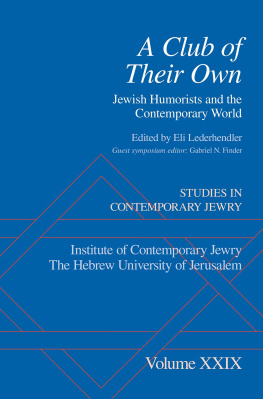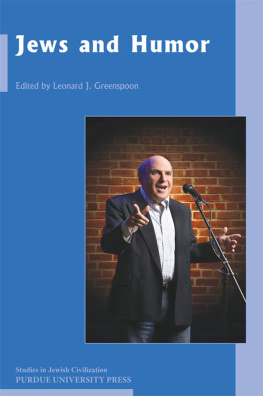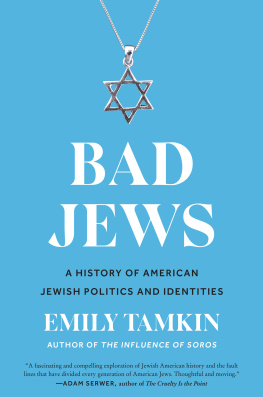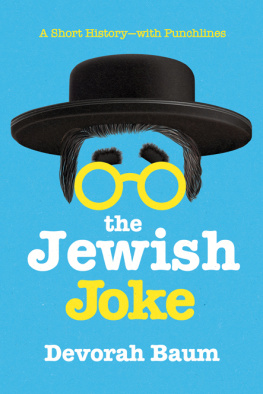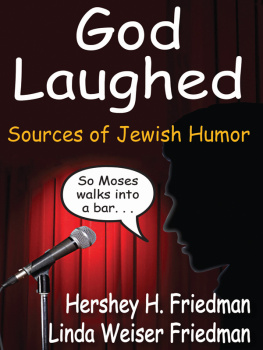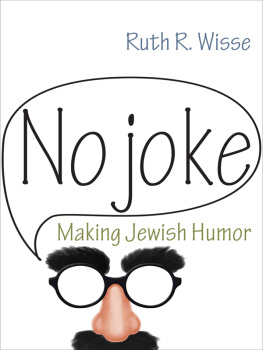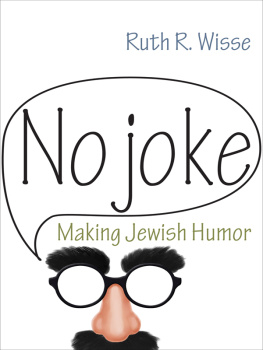Peter Y. Medding
Richard I. Cohen
Michel Abitbol, Mordechai Altshuler, Haim Avni, Yehuda Bauer, Daniel Blatman, Jonathan Dekel-Chen, Sergio DellaPergola, Sidra DeKoven Ezrahi, Amos Goldberg, Hagit Lavsky, Pnina Morag-Talmon, Dalia Ofer, Gideon Shimoni, Dimitry Shumsky, Yfaat Weiss
Laurie E. Fialkoff
Preface
The symposium in this volume, dealing with the Jewish cultural dimensions attached to the notion of humor (in its widest sense), follows upon a number of prior academic forays into this field. As has been the case with earlier volumes of Studies in Contemporary Jewry, our purpose is not so much to cap an emergent trend with a definitive round-table assessment, but rather to continue the discussion and perhaps advance it by bringing a host of new angles under consideration.
Why should humor, in its various manifestations, matter to students of modern Jewish culture and social history? For one thing, humor may be seen as a counterpoint to real or observed realityan improvised reflection upon something that exists, more than a representation of the thing itself. Humor is related to incongruity; almost by definition, it is an awareness of something being amiss. That would make of humor a secondary phenomenon, and although such things contribute to the social construction of the world as we see it, we might still be apt to relegate it to some marginal sector of the study of cultural consciousness.
As post-Freudians, however, we cannot but be impressed by the logic of the sublimated aggression and other properties of cultural encoding that jokes are apt to embody and express. The artfulness and the usefulness of an ulterior weapon, deployed by those engaged in outmaneuvering their fate, is not to be underestimated. It is, indeed, in this regard that we accept, at least as an initial proposition, the very real significance of the marginal, the out-of-tune, the off-kilter, the mocking and casual warping of harmonious (congruous) perception as a matter worthy of serious consideration.
Modern Jews have been known to claim this unhappy virtue, this belief in the rhetoric of comeuppance, almost as a rite of membership. This axiom brings to mind Groucho Marxs most famous quip, from which this volumes symposium takes its title. In his 1959 autobiography, Groucho and Me, Groucho recounts that he was invited to join a prominent theatrical organization. Harboring pretensions since his youth to high culture, he hoped to be able to talk about the giants of great literature with the other members. Instead, on his first visit he discovered that they were interested only in playing cards or philandering. He went again a few nights later and found himself seated next to a man who disparaged the organizations newest inductees. When Groucho tried to engage him in a discussion about literature, the man changed the topic, denouncing barbers newfangled use of the electric razor. The following morning, Groucho writes, I sent the club a wire stating, PLEASE ACCEPT MY RESIGNATION. I DONT WANT TO BELONG TO ANY CLUB THAT WILL ACCEPT ME AS A MEMBER. This is the club to which Groucho rightly belongs.
To underscore how crucial this notionthe Jewish jokesters desire to distance himself from a group to which he feels superior and in this way to forge a path to emotional freedomcan sometimes appear to be, people often point out that Jews made jokes even under Nazi occupationfrom Germany in the 1930s, to ghettos in Poland, to labor and concentration campsmocking Nazi leaders, criticizing Jewish councils, and looking for momentary solace in humor from their terrible ordeals. Particularly telling is the discovery in the recovered Ringelblum archives of two prewar sketches by Shimen Dzigan and Yisroel Shumacher. Although the main objective of the clandestine archive was to record Jewish life in the Warsaw ghetto and to collect evidence of Nazi crimes, it was deemed important as well to preserve artifacts of prewar Jewish life, including examples from the repertoire of this well-known comic duo.
Yet these preliminary remarks do not really do justice to the conceptual breadth required for this topic. Although a number of the essays in this volume are rooted in the proverbial semantics of laughter through tears, it makes more sense to us to see this as only one filtering paradigm for the study of humor in Jewish life and culture. Fortune also smiles, so we are told; and, that being so, we might wonder whether Jews find comic flaws even in decent life circumstances. Are Jews funny only when in distress, only when they are marginal, diasporic, visibly and unsettlingly other? Or are parody, irony, and satire such irresistible devices for playing up any form of idiosyncrasy that even when being Jewish is not what is at stake, Jews, donning the role of jester, often desire to be and are funny?
Here, we might point to the recent findings that about four in ten of all American Jews surveyed (42 percent) felt that having a good sense of humor was an essential part of what being Jewish means to them, on a par with caring for Israel (43 percent), and quite a good deal in excess of the importance to them of observing Jewish law (19 percent) and eating traditional Jewish foods (14 percent). There is little way of knowing what those respondents really had in mind: whether a good sense of humor is, for some of them, a mannerism that lends character and panache to a positive self-image, a humanizing trait that (hopefully) comes across as benign and attractive, or whether the fact that humor outranks religious practice simply means that the majority of respondents view Jewishness as a secular category.
In this vein, we might consider what William Novak and Moshe Waldoks have written: Jewish humor has in some ways come to replace the standard sacred texts as a touchstone for the entire Jewish community. Not all Jews can read and understand a page of Talmud, but even the most assimilated tend to have a special affection for Jewish jokes. Although Novak and Waldoks are describing Jewish humor in America, what they write here is probably relevant at least to all of the Jewish diaspora.

